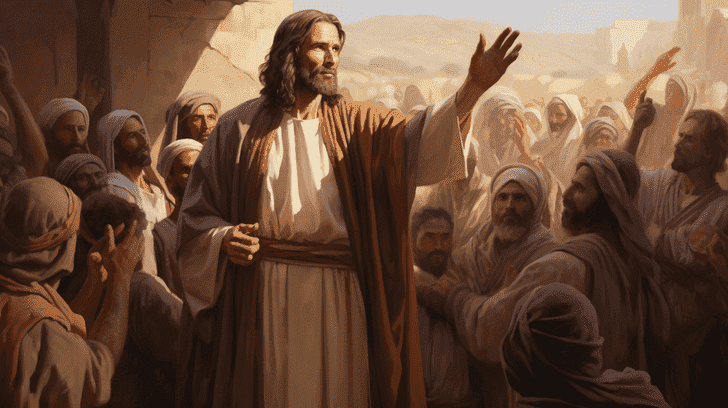The Pharisees, known for their strict adherence to religious traditions, accused Jesus of breaking the Sabbath commandment. But were these accusations justified, or did they stem from a misunderstanding of the true purpose of the Sabbath?
Join us as we explore the instances where Jesus challenged the religious leaders’ beliefs and revealed a deeper understanding of what it truly means to honor the Sabbath.
Prepare to have your perspective challenged and your understanding of Jesus’ teachings expanded.
Key Takeaways
- The accusations made against Jesus regarding Sabbath breaking were false and stemmed from man-made traditions attached to the Sabbath.
- Jesus healed people on the Sabbath to demonstrate compassion and to reveal the true purpose of the Sabbath.
- Jesus emphasized that Sabbath observance should not be burdened by legalistic interpretations.
- Jesus defended his actions by highlighting the value of human life and the principles of compassion.
Accusations of Sabbath-Breaking
The accusations of Sabbath breaking against Jesus were fueled by the Pharisees and were based on their misinterpretation of the man-made traditions surrounding Sabbath observance.
The Pharisees falsely accused Jesus of violating the Sabbath commandment by performing healings and miracles on that day. However, Jesus’ response to these accusations was clear and consistent.
He condemned the Pharisees for prioritizing their man-made traditions over the commandments of God. Jesus taught that the Sabbath was made for humanity’s benefit, not to burden them with legalistic interpretations.
He emphasized that acts of compassion and mercy, such as healing the sick or helping animals in need, weren’t violations of the Sabbath. Jesus’ teachings challenged the false accusations of the Pharisees and revealed the true purpose of Sabbath observance.
Healing on the Sabbath
Jesus’ response to the false accusations of Sabbath breaking by the Pharisees sheds light on the controversial topic of healing on the Sabbath.
Despite the religious leaders’ belief that healing on the Sabbath was against the law, Jesus performed healings on this sacred day to demonstrate compassion and to reveal the true purpose of the Sabbath.
Here are four instances where Jesus healed on the Sabbath:
- Jesus healed a man with a withered hand, challenging the Pharisees’ rigid interpretation of Sabbath observance. (Matthew 12:9-13)
- He healed a crippled woman who’d been bent over for 18 years, emphasizing the value of human life over legalistic rules. (Luke 13:10-13)
- Jesus healed a man with dropsy, showing that acts of healing aren’t in conflict with Sabbath rest. (Luke 14:1-6)
- He healed a paralytic man and instructed him to take up his bed and go home on the Sabbath, highlighting the principles of compassion and restoration. (John 5:1-14)
Through these acts, Jesus sought to redefine Sabbath observance and confront the religious leaders’ misguided Sabbath controversies with his message of love and healing.
Eating and Gathering on the Sabbath
Occasionally, instances of eating and gathering on the Sabbath were met with controversy and accusations by the Pharisees.
The Pharisees accused Jesus of teaching His disciples to break the Sabbath by plucking heads of grain and eating them. In response, Jesus referred to the example of David and his companions eating the showbread on the Sabbath.
He also highlighted the tasks performed by the priests in the temple on the Sabbath, such as sacrificing lambs and maintaining the altar. Jesus emphasized that Sabbath observance should not be burdened by legalistic interpretations.
He taught that the Sabbath is meant to be a day of rest and worship, but it should not restrict acts of compassion and meeting basic needs. Jesus challenged the Pharisees’ strict interpretations of Sabbath restrictions and emphasized the principles of love and mercy. (Matthew 12:1-8)
Sabbath Healing and Controversy
When examining the controversies surrounding Jesus’ actions on the Sabbath, it becomes evident that his healings and miracles challenged the strict interpretations of Sabbath restrictions imposed by the Pharisees.
These controversies can be summarized as follows:
- Religious opposition: The religious leaders, particularly the Pharisees, strongly opposed Jesus’ healing activities on the Sabbath. They believed that such actions violated the Sabbath law and undermined their authority.
- Compassion and healing: Jesus’ actions on the Sabbath were driven by his deep compassion for those in need. He saw the Sabbath as an opportunity to alleviate suffering and demonstrate the true purpose of the Sabbath, which is to bring wholeness and restoration.
- Defending human life: In each instance of Sabbath healing, Jesus defended his actions by emphasizing the value of human life over legalistic interpretations of Sabbath observance. He argued that it’s lawful to do good and save lives on the Sabbath.
- Challenging traditions: Jesus’ healings on the Sabbath challenged the man-made traditions and regulations that had been attached to the Sabbath observance. He sought to restore the true meaning of the Sabbath, which is a day of rest, worship, and acts of mercy and kindness.
Jesus’ View on the Sabbath
Jesus’ view on the Sabbath can be understood by examining his adherence to the commandment, his teachings on Sabbath observance, and his actions that challenged the legalistic interpretations of the religious leaders.
Jesus taught that the Sabbath was made for humanity, not humanity for the Sabbath. He emphasized that acts of mercy, such as healing the sick, were permissible on the Sabbath.
Jesus’ Sabbath teachings focused on the true purpose of the Sabbath, which was to show compassion and bring rest to the weary.
His actions, such as healing the sick and performing miracles on the Sabbath, demonstrated his belief in the importance of prioritizing human needs over strict adherence to man-made rules.
Jesus’ view on the Sabbath challenged the religious leaders’ legalistic interpretations and emphasized the spirit of the law rather than rigid adherence to its letter.
The Importance of Keeping the Sabbath
To fully comprehend the significance of keeping the Sabbath, it’s essential to understand Jesus’ teachings on the subject and the principles he emphasized concerning Sabbath observance.
Jesus viewed Sabbath observance as important and taught his disciples to honor the Sabbath day.
He emphasized that Sabbath observance shouldn’t be burdened by legalistic interpretations but should be a day of rest and worship.
The importance of keeping the Sabbath can be understood through the following points:
- Rest and rejuvenation: Sabbath observance provides an opportunity to rest from work and recharge physically, mentally, and spiritually.
- Communion with God: Keeping the Sabbath allows believers to dedicate time to worship, prayer, and fellowship with God.
- Family and community bonding: Sabbath observance encourages spending quality time with family and participating in communal worship and activities.
- Spiritual blessings: Observing the Sabbath brings blessings from God, including spiritual growth, peace, and a deeper relationship with Him.
Conclusion
In conclusion, Jesus’ actions regarding the Sabbath challenged the religious leaders of his time. Despite the accusations and disputes, Jesus consistently prioritized compassion and healing over man-made traditions.
By redefining the true purpose of the Sabbath, Jesus emphasized the importance of prioritizing love and mercy over rigid adherence to man-made laws.
My Letter To A Sunday Keeper – Sabbath Documentary

The Days of Noah – Powerful Documentary (Video Format)

Bible Studies – Written Format







